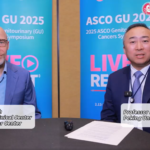
From February 20 to 22, 2025, the European Association for the Study of the Liver (EASL) Liver Cancer Summit was held in Paris, France. The first day of the conference was dedicated to Cholangiocarcinoma (CCA). Dr. Chiara Braconi, a leading expert in cholangiocarcinoma treatment from the University of Glasgow, UK, delivered a keynote lecture and later sat down for an exclusive interview with our publication.In this interview, Professor Braconi shared her insights on accessibility to systemic therapies for cholangiocarcinoma in Europe and China-Europe collaboration in advancing CCA treatment. Below is the full transcript of the conversation.
Professor, in your presentation on the access to systemic treatment of CCA in Europe, could you elaborate on the current status of resource allocation and patient access to systemic treatment for CCA across European countries?
Braconi:In Europe. We do have a general approval pathway first, which involves the European medical agency. Once the approval has been achieved, then it is up to each level to each country to really have an approval pathway in place. And that obviously will be different from country to country. And with emergence of a new drugs that are potentially useful in cholangiocarcinoma. We tend to see a lot of inequities in the way that these plants are implemented across European countries. So still, we do have patients that access different drugs according to where they live.
What do you consider to be the main factors affecting the access to systemic treatment for CCA patients in Europe? Are there challenges in terms of policy, economics, or medical technology?
Braconi:Obviously is multifactorial. There isn’t one single reason that is responsible for this issue problem. It comes from the knowledge and awareness of different countries, the possibility to have dedicated teams for biliary cancer, because overall is a rare disease, which can raise their voice, and they can make the case to governance and to the countries. It depends. Obviously, on the economical status of the country. Every country has their own priority. Now spending the health budget, I think that what we can do obviously, is try to increase the priority for expenditure in biliary tract cancer.
With the continuous emergence of new drugs and treatment methods, what are the latest advancements or plans in Europe to improve the accessibility of systemic treatment for CCA?
Braconi:Obviously, a lot of people are coming here are experts in biliary tract cancers and liver cancers. So they are up to dated, but many of those who come, they try to increase their educational level, because this is a rare cancer and not everywhere. There is the possibility to have a dedicated then centralized system. So it is important that everyone is aware that when they see a patient with collateral carcinoma, they actually try to adhere to the guidelines and probably refer to cease to centers where they have more expertise. And they can try and reduce these inequalities. We tend to see that a lot of different, heterogeneous approach to the management of these patients that comes from the fact that there is an overload of the smaller community hospitals, so that at times they don’t have the resources or the infrastructures that we offer for what it should be offered.
Looking ahead, what do you see as the future prospects for improving access to systemic treatment for CCA in Europe? What are the key factors that need to be focused on and promoted?
Braconi:I think it’s important to really join our forces together. We do, we are working in Europe with a European network of the study of cholangiocarcinoma in the precision btc net work where we are really trying to bring together members from all different countries. And this is a key. If we wanted to really fill the gap of inequities across Europe, that is obviously needed to be enlarged beyond Europe. We are trying to do that as part of the precision b to c network, we have many partner countries which are beyond Europe and outside right Europe. And I think that this is where we can work together and stay together in network is where it can help in this sense.
Professor, what areas do you think Europe and China can learn from or collaborate with each other in the research and clinical practice of CCA treatment? How can both sides strengthen exchanges and cooperation to jointly promote the development of this field?
Braconi:I think that there are two main key factors that can boost the collaboration between China and Europe. In general. One is the fact that we need to have patients representations from all different countries in our clinical trials, because that is the way to provide the evidence that a scientific data is actually applicable to your specific region and area. And the other side is that obviously in Asia and China, we know the incidence of liver cancer is I and so it is really important to make sure that we collaborate and we join. They expedited these together to really make advancements.


